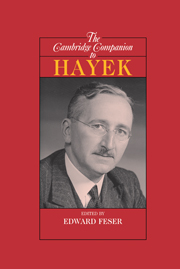Book contents
- Frontmatter
- Introduction
- 1 Hayek and the Austrian tradition
- 2 Hayek on money and the business cycle
- 3 Hayek and market socialism
- 4 Hayek and Marx
- 5 Hayek versus Keynes: the road to reconciliation
- 6 Hayek on knowledge, economics, and society
- 7 Hayek and Popper: the road to serfdom and the open society
- 8 Hayek’s politics
- 9 Hayek the philosopher of law
- 10 Hayek and liberalism
- 11 Hayek and conservatism
- 12 Hayek on the evolution of society and mind
- 13 Hayek on justice and the order of actions
- 14 Hayek the cognitive scientist and philosopher of mind
- Guide to Further reading
- Bibliography
- Index
12 - Hayek on the evolution of society and mind
Published online by Cambridge University Press: 28 January 2007
- Frontmatter
- Introduction
- 1 Hayek and the Austrian tradition
- 2 Hayek on money and the business cycle
- 3 Hayek and market socialism
- 4 Hayek and Marx
- 5 Hayek versus Keynes: the road to reconciliation
- 6 Hayek on knowledge, economics, and society
- 7 Hayek and Popper: the road to serfdom and the open society
- 8 Hayek’s politics
- 9 Hayek the philosopher of law
- 10 Hayek and liberalism
- 11 Hayek and conservatism
- 12 Hayek on the evolution of society and mind
- 13 Hayek on justice and the order of actions
- 14 Hayek the cognitive scientist and philosopher of mind
- Guide to Further reading
- Bibliography
- Index
Summary
INTRODUCTION
As a rule, Hayek has not been treated kindly by scholars. One would expect that a political theorist and economist of his stature would be charitably, if not sympathetically, read by commentators; instead, Hayek often elicits harsh dismissals. This is especially true of his fundamental ideas about the evolution of society and reason. A reader will find influential discussions in which his analysis is described as “dogmatic,” “unsophisticated,” and “crude.” In this chapter I propose to take a fresh start, sketching a sympathetic interpretation of Hayek's accounts of social evolution and mind as fundamental to his thinking. My basic claim is that Hayek's views on social evolution and reason are not only intimately bound together, but they also depend on his analyses of complex orders, scientific explanations of such orders, and the place of rules in complex orders. Because so few commentators recognize that his claims about evolution are embedded in a system of ideas, most misunderstand him.
THE COMPLEX ORDER OF ACTIONS
Complex phenomena
Hayek repeatedly refers to “the twin ideas of evolution and spontaneous order.” Although some commentators question whether these ideas are related, Hayek’s insistence on the link between evolutionary analysis and spontaneous orders in writings spanning a number of years indicates that we need to make sense of the “twin ideas thesis” if we are to grasp what he has in mind.
- Type
- Chapter
- Information
- The Cambridge Companion to Hayek , pp. 232 - 258Publisher: Cambridge University PressPrint publication year: 2006
- 27
- Cited by



